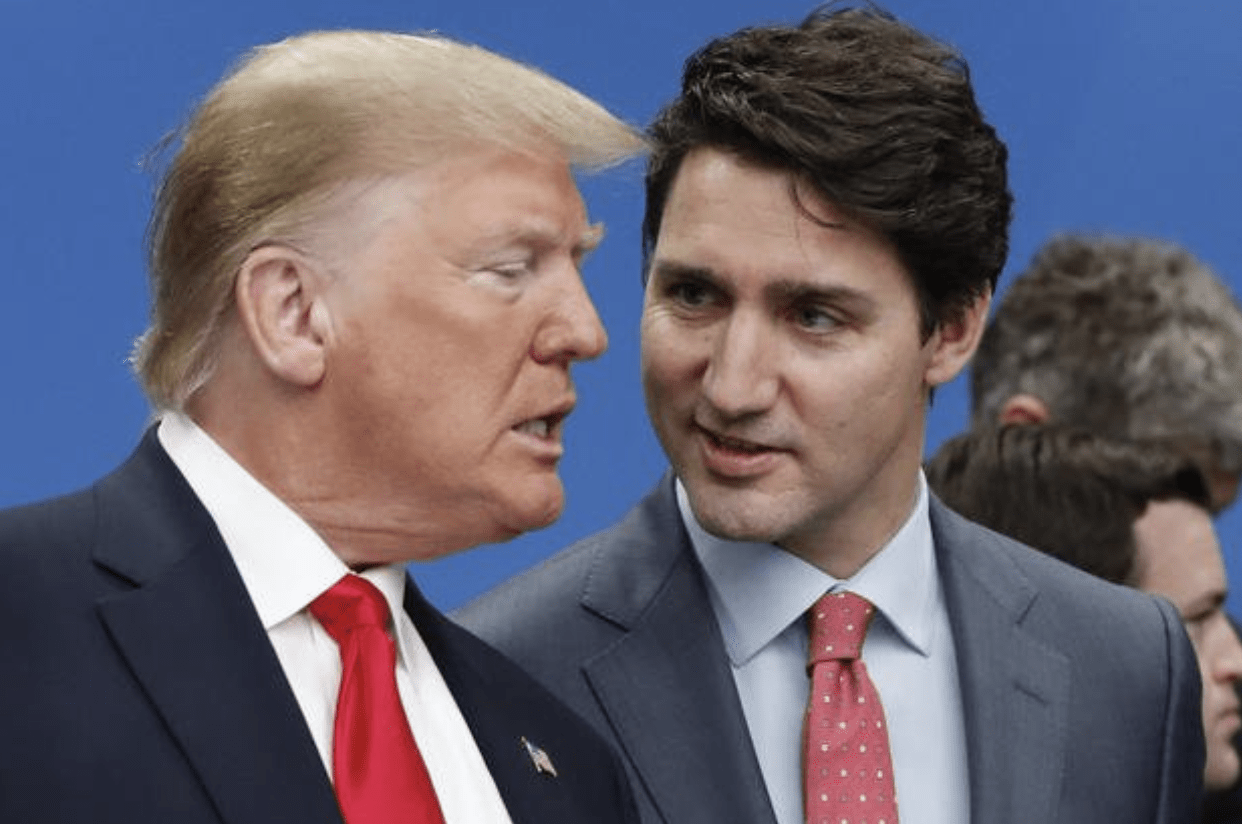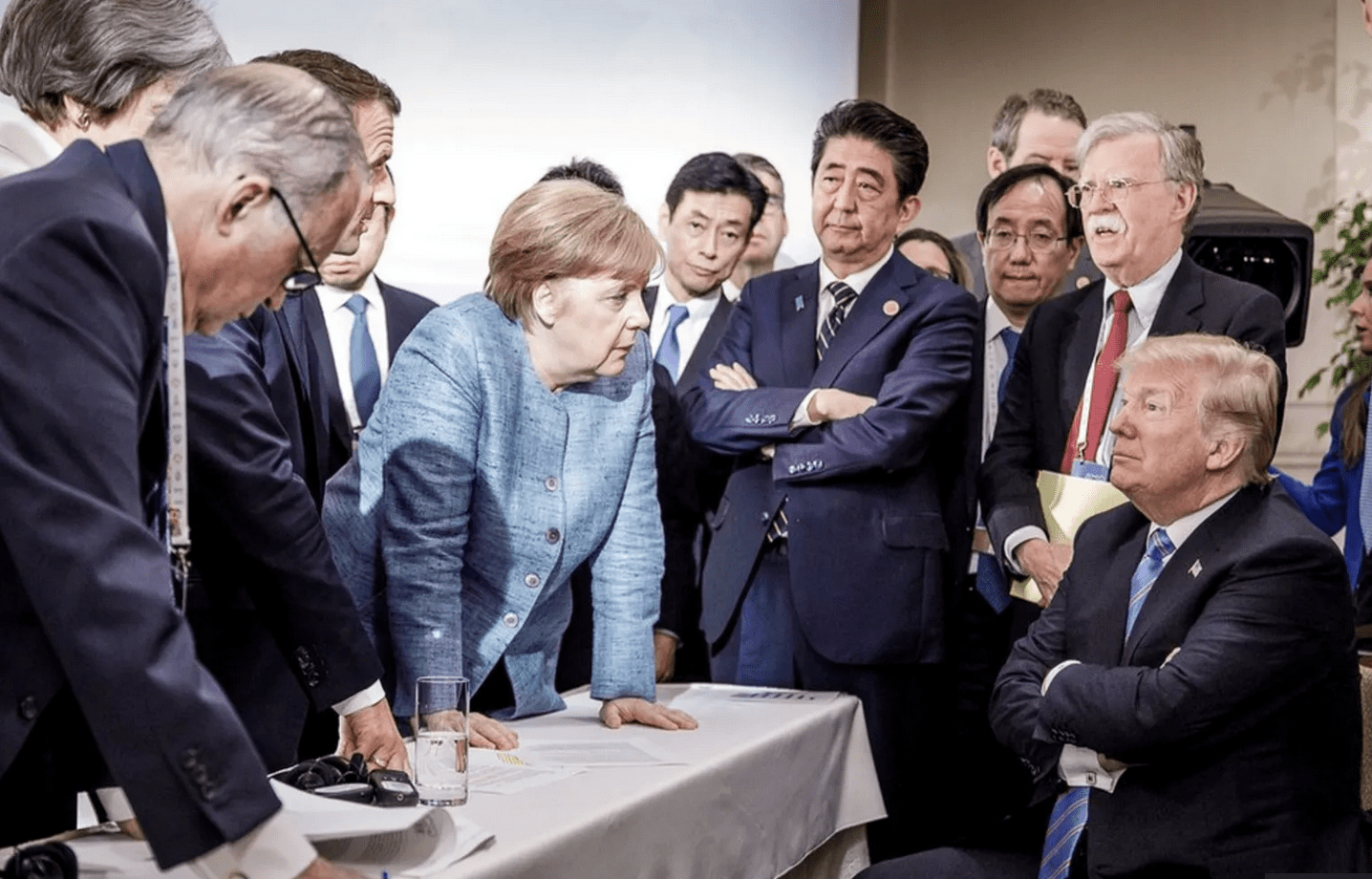The Allies’ Dilemma: Responding to a Second Trump Term
 Donald Trump and Justin Trudeau at the 2019 NATO summit in Hertfordshire, UK/AP
Donald Trump and Justin Trudeau at the 2019 NATO summit in Hertfordshire, UK/AP
Michael W. Manulak
November 24, 2024
As America’s allies and partners awoke on November 6, news of Donald Trump’s resounding election victory provoked widespread dismay. His win in 2016 could be explained away; despite some extreme statements on the campaign trail, voters had decided to take him seriously, not literally. This time, despite years of America-first nativism, an effort to subvert American democracy, and multiple felony convictions, Americans voted for him with eyes wide open.
Trump’s return to the White House presents a dilemma for US allies: While they support strong U.S. leadership of the rules-based international order, a zero-sum, transactional foreign policy in Washington undermines that order. Trump’s re-election risks forcing allies to choose between America and the international order it helped create.
Complicating matters, it is an order already under strain. U.S. primacy – to the extent that it existed in a post-Cold War, unipolar context – is a thing of the past and international institutions must evolve. Yet, this does not mean that the existing rules-based system should be discarded in favor of big power dominance or spheres of influence. The liberal core of the existing system should be adjusted to new realities, not abandoned. U.S. allies and partners must thread the needle, supporting U.S. leadership where they can, while at the same time bolstering the international order.
Bigger than Itself
Following the Second World War, U.S. power and ideas were essential in the construction of an unprecedented system of norms, rules, and institutions that stabilized and secured a war-prone world. The rule of law rather than the whims of big powers would govern world politics. Although some allowances were made for large power privileges, including in the voting rules at the World Bank and in granting five powers permanent, veto-wielding seats on the United Nations Security Council, big states would be bound by the same rules as smaller ones. One-country, one-vote procedures and dispute resolution mechanisms disciplined the exercise of power to an unprecedented degree. This would be a liberal order.
It was an order that many could buy into. With its allies and partners, the U.S. was central to a system that was bigger than itself. In this, to be clear, self-interest always motivated U.S. behavior. Power was always an essential ingredient. And, as countries in Central America and the Middle East can attest, global rules were far too often applied inconsistently. Still, these exceptions largely proved the rule. It is indeed the high ideals embodied in this order that lend themselves so readily to charges of hypocrisy. Despite the temptations of almost unparalleled power, U.S. leaders have usually played by the rules.
U.S. allies backed this vision and the ideas it represented. And they assisted in bearing the burden of global leadership. It helped that they benefitted from the U.S.-led order. Yet it has usually been easy to support U.S. diplomacy because of what it represented: an attempt to create an international system conducive to prosperity, democracy, and human rights.
A Stark Choice
Trump’s return presents allies and partners with a stark choice: do they continue to support American positions on critical international questions, even when U.S. actions threaten a well-functioning international order? Can they effectively wait out Trump, hoping for a more cooperative administration in four years, or must they counter his more damaging policies now? Some examples illustrate the dilemma.
European Security and NATO
On European security, Trump has long been a NATO critic. During the 2024 campaign, he urged Russia “to do whatever the hell it wants” to allies that did not reach 2% of GDP on military spending. Many allies wonder about the credibility of U.S. security commitments, even if they reach NATO’s target. By injecting uncertainty, Trump imperils European security while Russia wages a dangerous war in Europe. Such a context creates the conditions for misunderstanding and the possibility of escalation.
At its 75th anniversary summit, NATO allies sought to “Trump-proof” the alliance, including moving elements of military aid to Ukraine from U.S. to NATO command. Despite this, if the U.S. decides to reduce its assistance, Ukraine’s defense against Russia will be difficult to sustain and the damage to the credibility of the broader rules-based system will be substantial. If the world will not uphold its most basic rule, the inviolability of borders, what kind of a rules-based order exists?
Given the centrality of the U.S. within NATO and the broader European security equation, allies must decide how to respond to an administration that threatens to violate NATO’s must fundamental obligation. Do they pander to Trump in the short run, effectively hoping to wait out his administration, or move to reinforce the role and integrity of the alliance?
Climate Change
Given Trump’s climate skepticism, his previous departure from the Paris climate agreement, and his recent calls to “drill baby drill,” the world is preparing for a difficult period in climate cooperation. Though the Inflation Reduction Act has super-charged clean-energy investments, including in Republican-leaning states, the possible loosening of U.S. environmental regulations and a climate-skeptic diplomatic posture could undermine global progress in addressing this critical challenge. The U.S. could go a step further than it did in 2020, leaving not just the Paris agreement but the overarching UN Framework Convention on Climate Change as yet another instance of Trump degrading status-quo institutions and norms to undermine the existing order.
With, according to the latest UN reports, global temperatures currently on track for 3.1° Celsius of warming above pre-industrial temperatures, U.S. obstructionism would be extremely dangerous.
 The preview: the image that famously captured Trump’s belligerence during the 2018 Charlevoix G7/AP
The preview: the image that famously captured Trump’s belligerence during the 2018 Charlevoix G7/AP
The U.S. cannot be a responsible actor on the world stage without playing an active part in tackling climate change. Just as the Trump administration is coming into office early in 2025, a new—and more ambitious—U.S. Nationally Determined Contribution is due under the Paris agreement. To many, climate commitments and financing, as well as support for achieving the Sustainable Development Goals, are regarded as litmus tests for rich countries’ commitment to alleviating the burden on poorer ones.
In a time when the viability of broad international coalitions confers legitimacy in a competition of ideas with autocratic aspirational superpowers, maintaining credibility at the UN is essential. Should America’s friends aim to keep the U.S. in the tent on climate, even as it passes the buck on emissions reductions and financing, chewing up a disproportionate share of the world’s remaining “carbon budget”? How forceful should they be in calling out narrow, short-termism in U.S. policy?
Nuclear Disarmament and Non-Proliferation
With growing geostrategic competition underway, the U.S., China, and Russia are on the brink of a nuclear arms race. Russian rhetoric, including publicly lowering the threshold for the use of such weapons, has deepened the crisis facing the Nuclear Non-Proliferation regime. Although the Biden administration has also engaged in this race, it has made it clear that the U.S. does not need to match the combined — and expanding — nuclear forces of both China and Russia.
This perspective is not shared by key Trump advisors. In Foreign Affairs, Trump’s former National Security Adviser, Robert O’Brien, has written: “The United States has to maintain technical and numerical superiority to the combined Chinese and Russian nuclear stockpiles.” Such a program, O’Brien notes, would necessitate renewed nuclear testing, contravening a de facto global prohibition, and restarting the production of fissile materials. Whether these policies will be adopted by the new administration is unclear. O’Brien, however, appears likely to return in a senior national security role in the new administration.
With the New START agreement set to expire in 2026, all limits on American and Russian deployed strategic nuclear weapons will soon disappear. Andrew F. Krepinevich Jr. has described an inherently unstable “three-body problem” related to U.S.-Russian-Chinese nuclear dynamics.
With support for the Nuclear Weapon Ban Treaty growing and the 2026 Review Conference of the Nuclear Non-Proliferation Treaty (NPT) approaching, U.S. allies will need to think carefully about how they engage with a potentially defiant America on this vital issue. How can they reinforce a critical international security regime in the context of an arms race? How do they avoid seeing the cornerstone of the nuclear non-proliferation regime fall into disrepute? The next four years will be critical.
This says nothing of the challenge of halting a possible cascade of proliferation, as Iran gets the bomb, and allies question the credibility of U.S. guarantees.
A Way Forward
Although America’s friends hope for a more cooperative successor to Trump, there are real risks to a strategy of waiting him out. In the current context, solutions to key global problems simply cannot wait. In addition, Trump’s re-election and neo-isolationist rhetoric within U.S. society suggest that a less exceptional U.S. role could persist. Trump’s first term in office no longer appears an aberration.
America’s friends must determine where they can work with the new administration and where they must part ways. There will be opportunities to address certain problems, such as those posed in a new era of Cooperative Threat Reduction, for instance, through the G7-led Global Partnership Against the Spread of Weapons and Materials of Mass Destruction. U.S. allies and partners must maximize such areas of convergence. They should also encourage and capitalize on the president’s penchant for deal-making when productive. To whatever extent possible, U.S. allies and partners must engage in enmeshment diplomacy, keeping the U.S. engaged in global institutions.
Where they must buck Trump, U.S. allies and partners will need to band together through mechanisms, such as the Alliance for Multilateralism, where they can coordinate their efforts to reinforce the rules-based order and lessen susceptibility to Trump’s pressure tactics. In this effort, they will find many backers within the U.S. system, especially at the substate and subnational levels. Trump’s policies put his own short-term political interests above the longer-term interests of his country. This means that there will be plenty of support remaining within the U.S. for maintaining an international rules-based system that fundamentally serve’s America’s interests.
In defending global order, bedrock norms and institutions, such as territorial integrity and the United Nations, must be top priorities. They must not leave the field to autocracies to reshape these institutions in an illiberal mold. NATO’s integrity must also be preserved. In resolving this dilemma, allies must think about the wider system more than any actor within it.
Policy contributor Michael W. Manulak, an Associate Professor at the Norman Paterson School of International Affairs of Carleton University, holds a doctorate in International Relations from Oxford University. He served in the Government of Canada from 2015-2019, mainly within the Department of National Defence, representing the government internationally in proliferation security negotiations.
